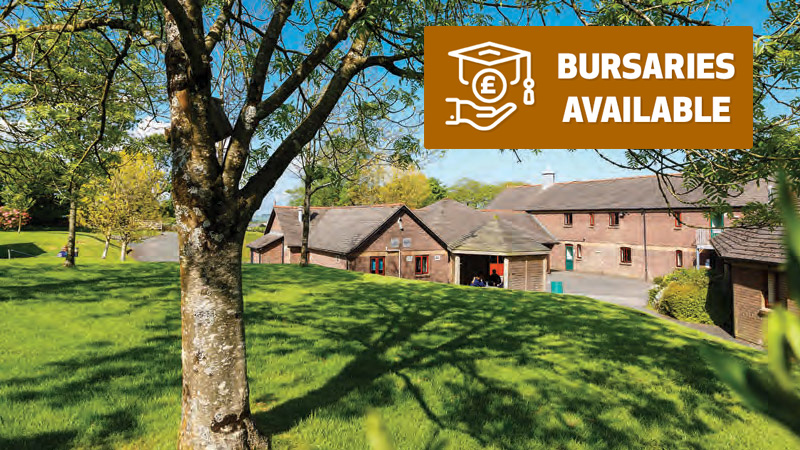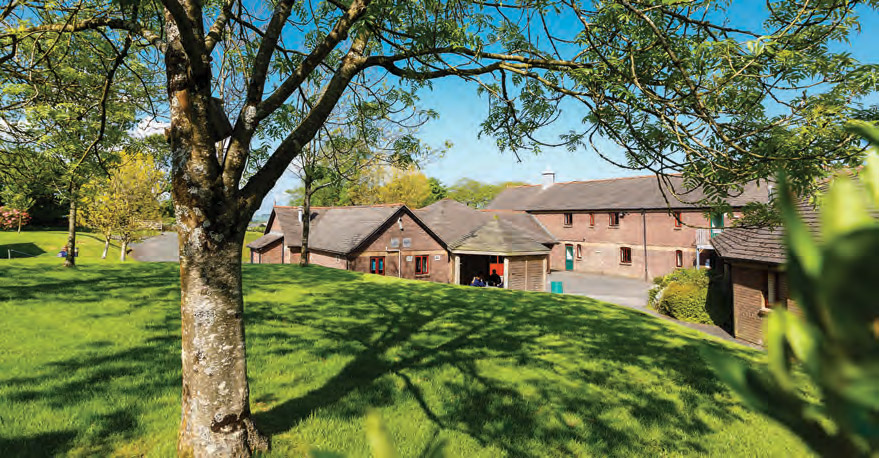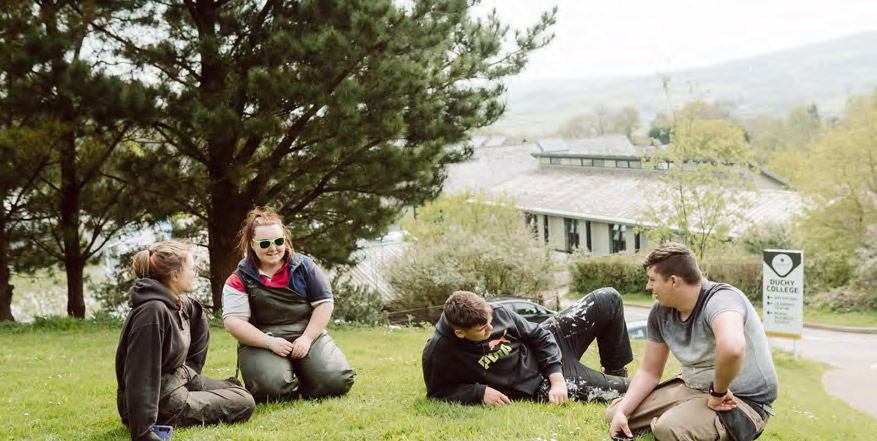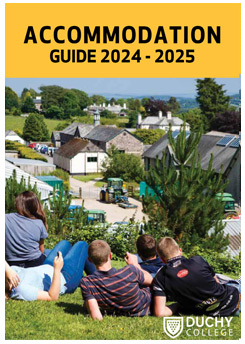
Accommodation
Duchy College has accommodation for over 100 students who live in halls of residence with support from a dedicated Residential Team 24 hours, seven days a week during college term time. Duchy College is a safe and enjoyable experience for students aged 16+.
Living in on-site accommodation is a unique home away from home experience which is a brilliant way of meeting new friends and gaining confidence and independence whilst having easy access to an outstanding education experience at Duchy College.
We are committed to providing support and care for our students, including help with personal development and adapting to living away from home. However, students living in accommodation are expected to be able live independently and a degree of maturity is required from the student to make a success of residential.
Residential students have access to the same support as all day students with a wide range of academic and wellbeing support during normal college hours. In addition, residential students have access to our residential services team who provide social activities and support for wellbeing outside of college hours when in residency. An emergency contact for sleep in staff is also available during curfew/sleep hours (11pm – 8.00am).
Students have access to a wide range of evening and weekend activities including free access to the gym, social spaces and student restaurant.
The rooms are bright and airy and we can offer a package:
- Shared room: For duty students. With access to shared toilet / shower facilities, kitchenette and small social area
- Single Study: Private room with shared toilet / shower facilities, kitchenette and small social area.
- Self Catering: Access to shared bathroom, kitchen and social areas. Available for students aged 18+ only
We also have a range of food packages available (a package must be selected for students aged under 18). Full details are available below and can be selected in your application form.
You will make lifelong friends at Duchy College and our residential students are a close knit community; many of you will be experiencing life away from home for the first time so you’ll have lots in common. The dining areas and residents lounge are always buzzing.
Duchy College Stoke Climsland
If you are interested in accommodation at Duchy College Stoke Climsland for the current academic year, please email residentialservicesduchy@cornwall.ac.uk
If you are interested in accommodation at Duchy College for the academic year 2026 – 2027, please add your details here: Expression of Interest in living in Halls of Residence for academic year 2026 – 2027
We will send you details of applications when these open.
If you would like a copy posted to you or require the application form in a different format, please contact residentialservicesduchy@cornwall.ac.uk
Living at Duchy College has many advantages. Students will have great opportunities to meet new friends and learn important independent living skills.
Students are close to all of the College facilities such as lecture rooms, computer suites, library, social areas and sports facilities. Food is provided in the College dining area and all the College staff you may need to contact are close at hand.
When a residential application is accepted, rooms will start to be allocated. Whilst allocation is primarily on a first come first served basis, where we are over-subscribed ahead of the initial allocation date the following will be applied:
- Students returning to complete a multi-year course
- Students under 18
- Distance of travel to college
We aim to accommodate students who may have specific and/or additional needs. However, there may be times when we are not able to make these reasonable adjustments. Please contact the Residential Team Lead to discuss requirements.
Please note the college is closed during half terms, Christmas, Easter and summer holidays. Students are not able to remain in their accommodation during these times. Students can usually leave their belongings in their rooms whilst the residential is closed. However, students may occasionally be required to empty their rooms during non-term time but secure storage locations will be provided if this is needed.
You will require a TV licence if you would like to have a TV in your room or you will live stream from your PC, laptop or gaming station.
Make sure you bring all personal equipment you feel you need to make your stay with us as homely as possible. This may include the following, a laptop, computer, games console, a lamp. mini fridge, duvet/pillows/blankets, toiletries, and washing tablets.
Within your accommodation there is a common room and a kitchenette where we supply and fridge and freezer, microwave and kettle. There are prohibited items such as toasters and toastie makers, grill machines, personal kettles.
Please talk to the team if you have any queries about any other items you would like to bring to college.
These are the prices for the current academic year. Prices for 2026 – 2027 will be shared when available. Small increases are likely for next academic year.
The options below enable you to choose your accommodation type and then the appropriate food package.
| STOKE CLIMSLAND ACCOMMODATION ROOM COSTS 2025-26 | |
| Single Study (private room with shared toilet / shower facilities, kitchenette and small social area) Note: A food plan must also be selected from below |
£4,176 for up to 36 weeks |
| Self Catering (access to shared bathroom, kitchen and social areas). Available for students aged 18+ only. |
£5,040 for 36 weeks £4,200 for 30 weeks (HE students only) (limited to Over 18’s only) |
| Duty students (short stay 3 nights / Friday to Monday to meet course needs) Note: This is only available where it is required for the course. This is booked and paid for in advance for EACH duty stay. |
£35 per night (includes an allocation of 2 meals) |
| Milking Duty students (one week meet course needs) Note: This is only available where it is required for the course. This is booked and paid for in advance for EACH duty stay. |
£175 per week (includes an allocation of 15 meals) |
Students will have an ID card that will also have your chosen allocation of meals loaded onto it for you to use in the catering areas. Each week, your allocation of meals will be uploaded onto the card for you. If you are applying for free school meals, you can apply for this by clicking this link, https://duchy.ac.uk/financial-support/ if eligible, this will be in addition to your weekly meal allowance.
If you require any help choosing your meal package, please get in touch with the residential team who will be happy to help.
| FOOD PACKAGES 2025-26 Please select the most appropriate package based on the timetabled days on campus or likely use of accommodation. |
|
| Short Stay (choose if only likely to be in accommodation for 2 days / nights per week) | £1,026 per year A weekly allocation of 6 meals |
| Basic (choose if likely to be on campus for 3 days / 4 nights). Note: most courses will have this study pattern. |
£1,710 per year A weekly allocation of 10 meals |
| Week (choose if likely to be on campus for 5 days / nights). | £2,565 per year A weekly allocation of 15 meals |
- A £125 non-refundable application fee is payable to secure a room allocation. This will cover services such as administration, PAT testing, laundry etc. This is paid when you set up the financial agreement.
- Accommodation fees are based on the room cost and selected food package for the year. You will receive one invoice for this full accommodation cost.
- Your accommodation contract is for the full academic year in order to allocate the room for use during term time for the full academic year. The accommodation fees are still payable in the case of any absence including work experience, study tours, sickness or choosing to commute rather than stay in your booked accommodation.
- If the accommodation is vacated by the accommodation occupant (including if the student is excluded) before the end of the academic year then fees are chargeable for the remainder of the academic year. This will only be reviewed in exceptional circumstances.
- Payment of fees is arranged on an individual basis and can be either 10 monthly instalments by direct debit, termly or paid in advance for the whole year.
- The full invoice of payment fees, OR the first payment of a payment plan, MUST be made by 31st August 2024 to confirm the accommodation and to provide access to accommodation in time for the first day of term.
- Students may not stay in residence during non-term time. Agreed start and end dates of each term will dictate when students must arrive and leave their accommodation. The accommodation fees take into account these non-term weeks.
- Any damages sustained to college property will be invoiced to the named bill payer.
- For all students, a guarantor (who is over 25) will be required to sign the accommodation contract and adequate payment arrangements made before the student enters accommodation.
Duchy College Rosewarne – although there are no specific halls of residence at Duchy College Rosewarne, we have developed an established network of local landlords who provide accommodation to suit all needs. This is available for students aged 18 and over only. Full details available here: https://www.cornwall.ac.uk/accommodation
Duchy College Rosewarne
We offer, the following housing options: rental through letting agents, private rental or a self-catering room within a family home.
It is not the college’s responsibility to inspect the properties, but we provide an up to date list of current properties available for students. Students must contact landlords/agents direct to arrange viewings of property.
Any contracts you enter are between the landlord and yourselves, but we are here to help if you have any questions/queries or would like any more detail on the properties.
House share
Renting a property with friends via a letting agent/private sector.
Note: letting agents have to be a member of one of three letting agent redress schemes. The letting agent redress scheme provides a free, independent service for resolving disputes between letting agents and their customers. Landlords and tenants can use the schemes. The decision made by a
redress scheme is binding on all parties. Ask your letting agent which scheme they belong to or check their website. Some letting agents
display details on stickers in their windows. There are three government approved letting agent redress schemes:
- The Property Ombudsman (TPO)
- The Property Redress Scheme
- Ombudsman Services Property
Room in a private house
This is where you rent a room out in a house where the landlord currently lives, you are the lodger. This type of accommodation can offer a bit more support when it is your first time living away from home.
Private Flats/Studio Flat
Private flats can appear extremely appealing if you’ve had a bad experiences previously sharing with other students. The two things to consider are firstly, whether you enjoy your own company – understand that whilst you’ll probably be out socialising in the day; you’ll most likely be by yourself
most nights. The other thing to consider with private flats is the price – they are likely to be the most expensive accommodation.
H.M.O. – Houses of Multiple Occupation
These are houses licenced by the local Council. From 1st October 2018 an HMO needs a licence if it is occupied by five or more people who form two or more households. The Council is responsible for enforcing HMO standards and can make a landlord take action to correct any problems. If you live in an HMO your landlord has to meet extra responsibilities which are in addition to their repair responsibilities. These are on:
- fire and general safety – mainly the provision of properly working smoke and/or heat
detectors with alarms and a safe means of escape in case of fire - water supply and drainage – these cannot be unreasonably interrupted and must be kept
clean and in good repair - gas and electricity – appliances and installations must be safe, which includes arranging an
annual gas safety check and having electrical installations checked at least every five years - communal areas – such as staircases, halls, corridors and entrances, must be kept in good
decorative repair, clean and reasonably free from obstructions - waste disposal – there must be enough bins for rubbish and adequate means of disposing of
rubbish - living accommodation – the living accommodation and any furniture supplied must be clean
and in good repair.
Here are some useful websites to give you hints on what to consider when looking for a student rental:
http://www.savethestudent.org/downloads/HouseViewingChecklist.pdf
For students studying at The Eden Project there are various options. Eden is situated within travelling distance of Bodmin, Lostwithiel, St Austell, Newquay and Truro.
St Austell
St Austell is a medium sized town with a shopping centre consisting of a variety of both local and national shops. The town centre has a popular 4 screen cinema, a tenpin bowling centre and a range of pubs, restaurants and cafes. There is also a leisure centre with sports hall, swimming pool and
squash courts etc. St Austell is approximately 1 mile from the coast and boasts wonderful coastal footpaths and several outstanding beaches. The beautiful Georgian village of Charlestown is a hugely popular tourist attraction and has been used as the location for many films and TV dramas, the latest being Poldark.
St Austell is on the main London to Penzance railway line with a link to an hourly bus service to the Eden Project and students studying at The Eden Project will benefit from a ‘First’ bus pass (subject to availability) which will give free journeys from St Austell train station to the Eden Project and 50%
reduction on bus travel throughout Cornwall.
http://staustelltown.co.uk/
http://www.visitthecornishriviera.co.uk/
Falmouth
Falmouth is a booming tourist destination and the town has continued to flourish, with the recent influx of students. Falmouth is an appealing place, with a cobbled and pedestrianised main street, a series of fine sandy beaches at the opposite end of town to the harbour, many attractive old pubs and an abundance of cafes and cocktail bars and a vibrant night life. Places of interest include Pendennis Castle and the National Maritime Museum. The National Maritime Museum is a centre of nautical excellence and is based in Events Square. This is a vibrant part of Falmouth’s water front with a great mix of shops, businesses and cafes and restaurants. Falmouth has good rail links to and from Truro.
Truro
Truro is a bustling Cathedral City and is Cornwall’s main shopping hub and is home to all the major stores and chains, although there are plenty of small, independent shops hidden away down narrow back streets. The Royal Cornwall Musuem, on River Street, contains exhibits from archaeological excavations across the county as well as a genuine Egyptian mummy. Truro has a vibrant nightlife with many clubs, bars and restaurants. It also has a leisure centre. With its central location and good transport links, (it is on the main London to Penzance rail line), Truro makes a great base for
exploring the rest of Cornwall.
www.enjoytruro.co.uk
www.visittruro.org.uk
Bodmin
Bodmin is one of the oldest towns in the County with a great deal of history. Bodmin sits on the edge of Bodmin Moor an Area of Outstanding Natural Beauty – the moors offer walking and horse riding. It has a busy town centre with both independent shops and national chains, restaurants and pubs. Bodmin is on the main London to Penzance rail line and has good bus links.
https://www.visitcornwall.com/places/bodmin
Newquay
Newquay is a bright and bustling town and is one of the ‘go to’ places in Cornwall. It is busy all year round with locals, visitors and students and offers beautiful beaches, spectacular coastal scenery and a thriving night life. Particularly famous for its association with surfing, Newquay has a host of
beaches. Towan, Great Western, Lusty Glaze and Tolcarne are all reasonably safe and sheltered and within easy reach of the town centre, while the more exposed Fistral regularly plays host to major surfing events, attracting competitors from all over the world. Newquay Zoo and the Blue Reef Aquarium are popular attractions. There are a good selection of local shops, cinema and a leisure centre. It has good bus links and a links up to the main London to Penzance rail line via the Par to Newquay branch line.
www.newquay.co.uk
www.visitnewquay.org
Camborne
Camborne is best known as a centre for the former Cornish tin and copper mining industry. The town centre offers traditional, local businesses and national chains. Some of Cornwall’s finest scenery, heritage and nature can be found right on Camborne’s doorstep. Within just a few miles, there are the cliffs at Hell’s Mouth, and the bluebell-strewn woodlands at Tehidy and Pendarves. Portreath is a North Coast beach approximately 4 miles from Camborne and is a popular beach for surfers and body boarders and a few shops, cafes and pubs. Portreath also forms part of the Coast to Coast trail to Devoran. Camborne has good public transport and is on the main London to Penzance rail line.
Accommodation costs can vary from location to location. Some accommodation will include all bills, utilities etc., and with some there will be additional costs. It is important to budget carefully.
Additional costs to consider when renting
When renting a property, the monthly rent is unlikely to be your only expense. There will be other costs you should consider in order to calculate how much you and your new housemates can afford each month.
TV licence:
This can be paid either annually or in monthly instalments. If you are renting a property on a group tenancy then you will be liable for only one licence, however if sharers with individual agreements will need a licence for each occupier that owns and uses a TV. If you’re renting a room in a private hall, you need to check if you need a TV licence for a TV in your living area or bedroom. You’re also required to purchase a TV licence if you watch live streaming via your PC or laptop. (see links below)
Utility bills:
These are payable in a number of ways and it is advisable to check with your landlord/letting agent what exactly they require from you (many will ask for proof of payments before returning your deposit).
Internet/Digital TV:
Optional. Internet can be highly useful when it comes to coursework and revision, and more importantly, checking your Facebook!
Contents insurance:
Definitely something to consider and well worth the money just in case something were to happen.
Council tax:
Whilst full–time students are exempt from this, part–time students are not. If you are planning on living with part–time students, you will need to take council tax into consideration. (You will need to obtain a certificate from the college confirming your course details to take to the
Council to obtain exemption).
Food:
Food can be expensive. Cut down the costs by eating together – it’s a great social activity and it’ll save you money.
From September 2016 Renting A Home
You need to be covered by a TV Licence to watch or record live TV programmes on any channel, or download or watch BBC programmes on iPlayer.
This could be on any device, including a TV, desktop computer, laptop, mobile phone, tablet, games console, digital box or DVD/VHS recorder. If you do any of the above without a valid licence, you risk prosecution and a maximum penalty of up to £1,000, plus any legal costs and/or compensation
you may be ordered to pay. You will also still have to buy a TV Licence if you need one.
To find out more, go to tvlicensing.co.uk/studentinfo
How can I buy a TV Licence?
There are lots of different ways to buy a TV Licence. Whether that’s through weekly cash payments, using your nearest PayPoint outlet, spreading the cost with monthly, quarterly or yearly direct debit, credit/debit card or by post – just choose the one that suits you best.
For more information on the ways to pay, go to tvlicensing.co.uk/payinfo
What if I live in a shared house?
You’ll probably only need one licence between you if you have a joint tenancy agreement for the whole house – this is the most common type of shared house arrangement. You might need your own licence if your accommodation is self-contained. That means you have exclusive access to washing facilities, or your own entrance to the property. You will also need your own licence if you have a separate tenancy agreement for your own room. If you’re not sure, check our advice for tenants and lodgers.
Won’t my parents’ licence cover me?
Your parents’ licence will not cover you while you’re away at uni unless you only use a device that’s powered solely by its own internal batteries and not connected to the mains.
What if I’m not at uni for the summer?
If you’re leaving your halls or rented accommodation and moving back home for the summer, there’s a good chance you won’t need your TV Licence if there’s one at home. You can see our policy and apply for a refund online
Assured shorthold tenants have a number of important rights. However, if your landlord follows the correct legal process, they can evict you quite easily. You should bear this in mind before trying to enforce your rights. For example, some landlords may decide to evict a tenant rather than doing
repair work which is being complained about.
Most landlords will give you an inventory at the start of your tenancy. You will be in a much stronger position to argue about maintenance issues if you have filled out an inventory; or have taken photographs of the property on the day of moving in.
You should be given a copy of the tenancy agreement before you move in, and it would normally include the date it began, the rent due and when it must be paid, how and when the rent can be changed and the length of any fixed term. Always a good idea to ask for a copy of the tenancy agreement and to check it carefully before you sign it.
Your landlord must put your deposit in a government-backed tenancy deposit scheme (TDP) if you rent your chosen accommodation on an assured shorthold tenancy that started after 6 April 2007. However, if you do not have an assured shorthold tenancy your landlord doesn’t have to use this scheme but it is advisable. In England and Wales your deposit can be registered with:
- Deposit Protection Service (Custodial and Insured)
- MyDeposits
- Tenancy Deposit Scheme (Custodial and Insured)
They make sure you’ll get your deposit back if you:
- meet the terms of your tenancy agreement
Your landlord or letting agent must put your deposit in the scheme within 30 days of receiving it.
At the end of your tenancy
Your landlord must return your deposit within 10 days of you both agreeing how much you’ll get
back.
If you’re in a dispute with your landlord, then your deposit will be protected in the TDP scheme until the issue is sorted out.
Holding deposits (this is the payment to secure your chosen accommodation)
Your landlord doesn’t have to protect a holding deposit (money you pay to ‘hold’ a property before an agreement is signed). Once you become a tenant, the holding deposit becomes a deposit, which they must protect.
Deposits made by a third party
Your landlord must use a TDP scheme even if your deposit is paid by someone else, e.g. a rent deposit scheme or your parents.
For more information go to https://www.gov.uk/tenancy-deposit-protection/overview
Go through the inventory with the landlord before you even unpack your belongings. This is a list of all items within the property and the condition they are in. If you disagree with something this is the time to document it on the inventory.
- Take photographic evidence of all areas of the property (internally and externally) before you unpack. Make sure your photos are dated.
- Get the landlord to show you where the water stop cock is and where the meters are for gas and electricity. Take meter readings.
- Ensure that the landlord gives you a copy of your tenancy agreement, details of where the deposit is being held and their contact details in case of emergency.
- Make sure you know the refuse collection days.
Bursary Assistance Available
Residential Bursary 16 – 18 years
We are pleased to be able to provide access to a residential bursary to help with some of the cost of accommodation. This is available to those with a household income of £52,000 or less. Other criteria must also be met.
You can find out more and apply for a bursary by visiting www.cornwall.ac.uk/financial-support
Residential Bursary 19 – 30 years
If you are studying a further education course you may be eligible for assistance with accommodation costs with a Residential Bursary.
For more details please visit www.cornwall.ac.uk/adult/aeb-funding .
If you need any help completing these applications, please call 0330 123 2523, and we can support you.
Please be aware that the Residential Bursary is for students who have no alternative but to lodge in order to attend their chosen course of study. It only pays for the 36 weeks of the academic year and any shortfall in costs will be your responsibility. It is expected that you retain a home address, and you will need to provide evidence of this. You cannot be in receipt of Housing Benefit / housing element of Universal Credit; and if you are co-habiting you can only claim your share of any rental costs.


 Officially Outstanding - Read More
Officially Outstanding - Read More


